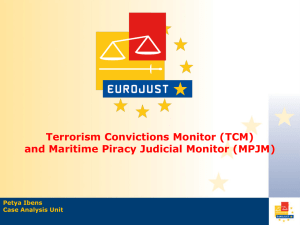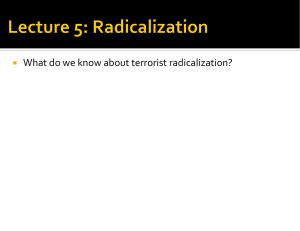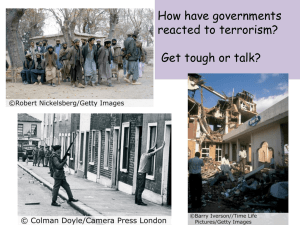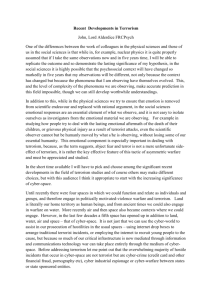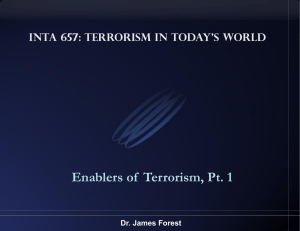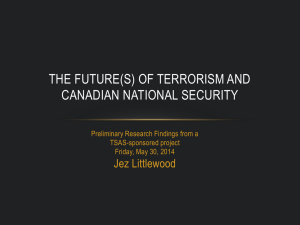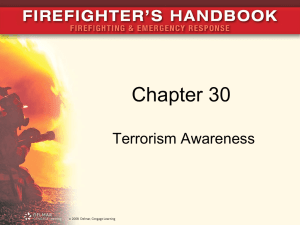21st century Terrorism: How should we respond?
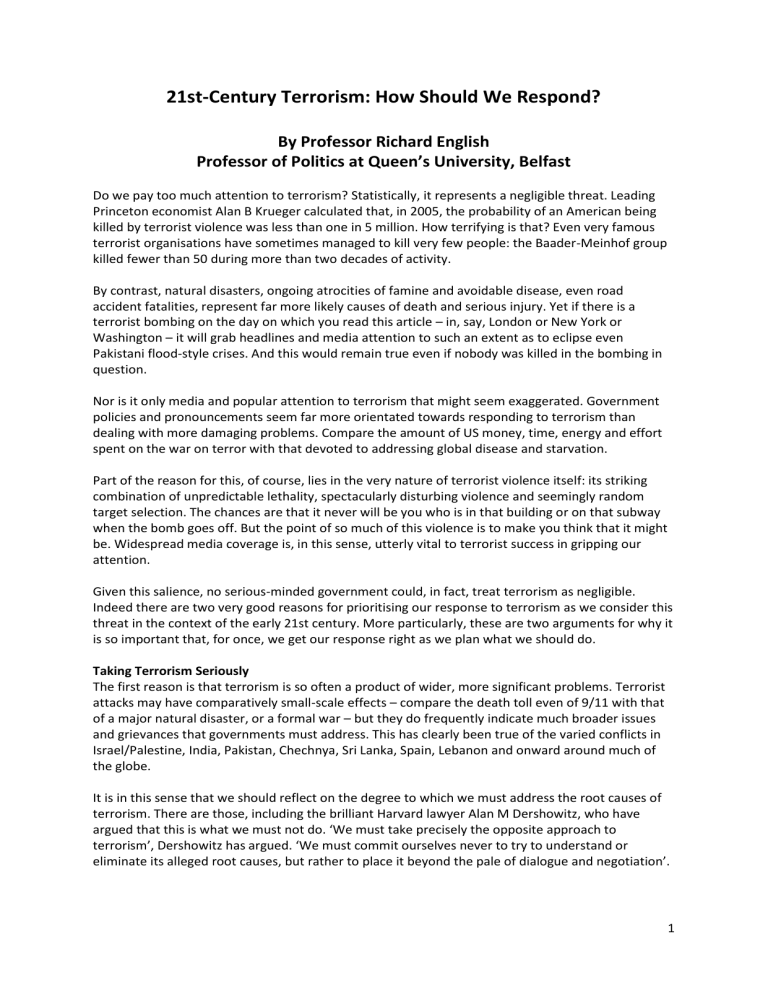
21st-Century Terrorism: How Should We Respond?
By Professor Richard English
Professor of Politics at Queen’s University, Belfast
Do we pay too much attention to terrorism? Statistically, it represents a negligible threat. Leading
Princeton economist Alan B Krueger calculated that, in 2005, the probability of an American being killed by terrorist violence was less than one in 5 million. How terrifying is that? Even very famous terrorist organisations have sometimes managed to kill very few people: the Baader-Meinhof group killed fewer than 50 during more than two decades of activity.
By contrast, natural disasters, ongoing atrocities of famine and avoidable disease, even road accident fatalities, represent far more likely causes of death and serious injury. Yet if there is a terrorist bombing on the day on which you read this article – in, say, London or New York or
Washington – it will grab headlines and media attention to such an extent as to eclipse even
Pakistani flood-style crises. And this would remain true even if nobody was killed in the bombing in question.
Nor is it only media and popular attention to terrorism that might seem exaggerated. Government policies and pronouncements seem far more orientated towards responding to terrorism than dealing with more damaging problems. Compare the amount of US money, time, energy and effort spent on the war on terror with that devoted to addressing global disease and starvation.
Part of the reason for this, of course, lies in the very nature of terrorist violence itself: its striking combination of unpredictable lethality, spectacularly disturbing violence and seemingly random target selection. The chances are that it never will be you who is in that building or on that subway when the bomb goes off. But the point of so much of this violence is to make you think that it might be. Widespread media coverage is, in this sense, utterly vital to terrorist success in gripping our attention.
Given this salience, no serious-minded government could, in fact, treat terrorism as negligible.
Indeed there are two very good reasons for prioritising our response to terrorism as we consider this threat in the context of the early 21st century. More particularly, these are two arguments for why it is so important that, for once, we get our response right as we plan what we should do.
Taking Terrorism Seriously
The first reason is that terrorism is so often a product of wider, more significant problems. Terrorist attacks may have comparatively small-scale effects – compare the death toll even of 9/11 with that of a major natural disaster, or a formal war – but they do frequently indicate much broader issues and grievances that governments must address. This has clearly been true of the varied conflicts in
Israel/Palestine, India, Pakistan, Chechnya, Sri Lanka, Spain, Lebanon and onward around much of the globe.
It is in this sense that we should reflect on the degree to which we must address the root causes of terrorism. There are those, including the brilliant Harvard lawyer Alan M Dershowitz, who have argued that this is what we must not do. ‘We must take precisely the opposite approach to terrorism’, Dershowitz has argued. ‘We must commit ourselves never to try to understand or eliminate its alleged root causes, but rather to place it beyond the pale of dialogue and negotiation’.
1
This seems to me misguided. Honest recognition that there are sometimes serious root causes behind terrorist action does not legitimate terrorism at all. And it is frequently possible to address the underlying problems, which terrorists adduce as justification for their violence, in such a way as actually to undermine support for terrorism itself. Indeed, it is very often the case that terrorists’ supposed constituency will be satisfied with redress falling far short of what terrorists themselves have demanded as necessary; examples surely include the Basque Country in Spain, and Northern
Ireland. To fail to acknowledge and respond to such a reality risks causing greater disaffection than is necessary and even increasing support for terrorist violence.
Terror groups such as the Real IRA in N Ireland continue to pose a threat to the UK
The second reason for taking the terrorist threat very seriously is that, perhaps, the limited scale of terrorist capacity might be about to change in practice. One should beware overly stark depictions of supposedly ‘new’ terrorisms. Every recent decade has had its own declaration of ‘new’ terror, much of which, on closer inspection, proves to be rather familiar. This has been depressingly evident in the long wake of 9/11, since when the number of publications on terrorism has grown enormously, yet with many evincing shaky knowledge of what happened before 2001, or of the familiarity of so much of what has been taking place even after that atrocious attack.
Increased Threat
But is the terrorist threat greater in scale today? Certainly, the White House currently focuses much attention and anxiety on the possibility that a nuclear terrorist threat is before us. Many analysts think this to be an exaggerated and misplaced fear, and that may well be right. But chemical or biological weapons genuinely are a plausible means of terrorist attack, and the potential scale of such an assault would dwarf anything we have seen to date from non-state perpetrators of terrorist violence.
Moreover, even conventional terrorist weapons can produce large-scale death and injury – if the perpetrator does not want to survive, and if mass civilian casualties are their goal. The size of bombs used by the Irish Republican Army could have killed very large numbers of people in a single incident, had that been the organisation’s goal. One such attack, by another type of group, on the
United States in coming years would be likely to prompt a massive reaction from the US, and to change the political shape of the next few decades.
It is right that governments and the citizens whom they govern should alike consider the best way of responding to terrorism and treat this as a genuinely high-priority problem. But, in addition to addressing root causes (where and when that is a possibility), what other lessons does the long history of terrorism teach us about the pattern of our best response?
Limits of Military Means
Ironically, given the nature of the war on terror, we should probably avoid over-reliance on military means as we try to deal with terrorists. I was not one of those who thought a war on terror necessarily a false move; after all, anti-western terrorists have made clear that they are at war with us.
2
But the record of the war on terror, as actually practised and pursued on the foundation stones of two major wars in Afghanistan and Iraq, has not been at all inspiring. For this most extensive, expensive, expansive and ambitious human attempt yet to extirpate terrorism has not only failed to do so, in certain ways it has actually exacerbated the problem. In 2001, the year of the 9/11 atrocity, there were 1,732 recorded terrorist incidents worldwide; five years later, well into the war on terror, that annual figure had risen to 6,659 (see Figure 1).
If we consider fatal terrorist attacks, a similar picture emerges. In the three years and eight months prior to 9/11, the monthly death toll from terrorism worldwide was 109; in the 2001–07 period, that monthly figure rose to 158, excluding attacks in Afghanistan and Iraq. If one included terrorist attacks in those two conflicts, the tally rose from 109 per month to 529 per month.
Long experience should have taught us that military means can be ambiguous, and often counterproductive, in dealing with this kind of opponent and challenge. Well before the war on terror, French experience in Algeria, British experience in Northern Ireland and Israeli experience with Palestinian terrorism all suggested the limitations of military muscle when applied to this more elusive kind of threat.
Far more valuable is high-quality, detailed intelligence, interpreted by people with contextual knowledge and acumen. Again, the capacity of even very impressive states to miss this key feature of our response to terrorism has been striking. In the mid1990s, there was virtually no western intelligence presence in Afghanistan at all, and so al-Qaeda’s reorganisation, planning and activity went unmonitored, with hideous consequences in September 2001. Likewise, either the gathering of and/or the use of intelligence in the build-up to the 2003 Iraq War was near disastrous in effect.
Intelligence gathering and deployment bring their own problems, of course. This is a long-term commitment and an expensive one (though not when set against the costs of formal military engagement). It also brings moral challenges: the acquisition and running of agents and informers, and the decisions to be made about which intelligence to utilise and when to do so, all present difficulties. But the central fact remains that high-quality intelligence, wisely deployed, can prevent many terrorist attacks and minimise the threat faced as a result.
3
Living with Terrorism
One key aspect of responding to terrorism is that terrorism is not going to go away. The truth is that terrorism is something we will all have to learn to live with Individual terrorist campaigns will almost certainly end, many groups being unable even to sustain a campaign long enough to gain brand recognition for their work. But while terrorist groups fizzle out, terrorism itself does not.
This was neatly reflected in July 2005. That month saw the Provisional IRA finally call a formal end to their terrorist armed struggle against the British state; but it also witnessed, on 7/7, the bloody arrival in London of the consequences of a new terrorist assault on the UK.
Given the ongoing presence of terrorism, the war on terror was again probably miscast. Then president George W Bush set an unachievable goal when he declared that, ‘our war on terror begins with al-Qaeda, but it does not end there. It will not end until every terrorist group of global reach has been found, stopped and defeated’. This aim will never be accomplished, and the truth is that terrorism is something that we will all have to learn to live with. As such, minimising the amount of death, injury and destruction suffered is our best and wisest goal, and an admirable one in itself.
It is tempting, in the aftermath of a terrorist atrocity, to abandon orthodox legal restraints, and many states have tended towards this approach in the face of immediate terrorist violence. But it is probably more effective to adhere to trusted legal frameworks and to respect the democratically established rule of law. The history of terrorism does not produce a clear answer regarding the question of whether draconian legislation works against it, but the evidence seems to point towards the benefits of restraint.
Draconian changes of apparatus can backfire badly, giving propaganda benefit to one’s terrorist enemies and seeming to vindicate their otherwise implausible depictions of state iniquity. And it is far from clear that such extensions of legal capacity are of decisive benefit in fighting terrorism, when compared with the professional and calm utilisation of existing laws and frameworks. Much of the most effective work done to contain groups as varied as Baader-Meinhof and the IRA was done through patient, orthodox police work, which is probably our most effective response.
How different wings of the state co-ordinate their action against terrorism is another important ingredient of effective response. Since 9/11 and 7/7 there has been much work done to ensure more harmonious co-operation between different agencies in fighting the same fight. But problems persist, and the competition between rival wings of the same state – and the failure to harmonise efforts of different states sharing similar enemies – represents a key, if avoidable obstacle to successful counter-terrorist work.
Likewise, efforts to contain terrorist violence are hampered if the state sacrifices credibility in public argument. There is a frequent tendency to misrepresent and to caricature opponents in the face of non-state atrocity. This is an unnecessary mistake. Terrorist arguments, from Ayman al-Zawahiri to the Italian Red Brigades, are so frequently and demonstrably simplistic and implausible that patiently accurate state counter-argument can suffice, without recourse to Manichaean simplifications about straightforward good and evil, or a denial of terrorist commitment, ideology or support.
In some ways, then, we need both to make terrorism a real priority and simultaneously not to exaggerate our response. We should not misrepresent the nature of what we face by pretending that it is less rational or more evil than its practitioners show themselves to be by their actions. Nor should we exaggerate our capacity to extirpate terrorism entirely.
4
We should avoid overreacting militarily, or jettisoning the admirable legal frameworks which, in liberal democracies, represent a largely effective weapon against terrorists anyway. We need to ensure a lasting commitment to professional intelligence capacity, and to the co-ordination of counter-terrorist efforts. And, when possible, we should address the roots beneath this vicious and largely ineffective violent growth.
References
Berman, E. (2009) Radical, Religious and Violent: The New Economics of Terrorism. Cambridge: MIT
Press.
Dershowitz, A. M. (2002) Why Terrorism Works: Understanding the Threat, Responding to the
Challenge. New Haven, CT: Yale University Press.
Krueger, A. B. (2007) What Makes a Terrorist: Economics and the Roots of Terrorism. Princeton, NJ:
Princeton University Press.
Stepanova, E. (2008) Terrorism in Asymmetrical Conflict: Ideological and Structural Aspects. Oxford:
Oxford University Press.
This article was published in the Political Insight Magazine
5
